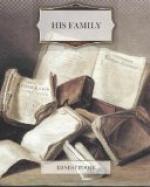“How does the flame earn his living?”
“At first in a sweatshop,” she replied. “But he came to my school five nights a week, and at ten o’clock when school was out he went to a little basement cafe, where he sat at a corner table, drank one glass of Russian tea and studied till they closed at one. Then he went to his room, he told me, and used to read himself to sleep. He slept as a rule four hours. He said he felt he needed it. Now he’s a librarian earning fifteen dollars a week, and having all the money he needs he has put the thought of it out of his life and is living for education—education in freedom. For Isadore has studied his name until he thinks he knows what it means.”
They found him in a small public library on an ill-smelling ghetto street. The place had been packed with people, but the clock had just struck ten and the readers were leaving reluctantly, many with books under their arms. At sight of Deborah and her father, Isadore leaped up from his desk and came quickly to meet them with outstretched hands.
“Oh, this is splendid! Good evening!” he cried. Hardly more than a boy, perhaps twenty-one, he was short of frame but large of limb. He had wide stooping shoulders and reddish hollows in his dark cheeks. Yet there was a springiness in his step, vigor and warmth in the grip of his hand, in the very curl of his thick black hair, in his voice, in his enormous smile.
“Come,” he said to Roger, when the greetings were over. “You shall see my library, sir. But I want that you shall not see it alone. While you look you must close for me your eyes and see other libraries, many, many, all over the world. You must see them in big cities and in very little towns to-night. You must see people, millions there, hungry, hungry people. Now I shall show you their food and their drink.” As he spoke he was leading them proudly around. In the stacks along the walls he pointed out fiction, poetry, history, books of all the sciences.
“They read all, all!” cried Isadore. “Look at this Darwin on my desk. In a year so many have read this book it is a case for the board of health. And look at this shelf of economics. I place it next to astronomy. And I say to these people, ’Yes, read about jobs and your hours and wages. Yes, you must strike, you must have better lives. But you must read also about the stars—and about the big spaces—silent—not one single little sound for many, many million years. To be free you must grow as big as that—inside of your head, inside of your soul. It is not enough to be free of a czar, a kaiser or a sweatshop boss. What will you do when they are gone? My fine people, how will you run the world? You are deaf and blind, you must be free to open your own ears and eyes, to look into the books and see what is there—great thoughts and feelings, great ideas! And when you have seen, then you must think—you must think it all out every time! That is freedom!’” He stopped abruptly. Again on his dark features came a huge and winning smile, and with an apologetic shrug, “But I talk too much of my books,” he said. “Come. Shall we go to my cafe?”




